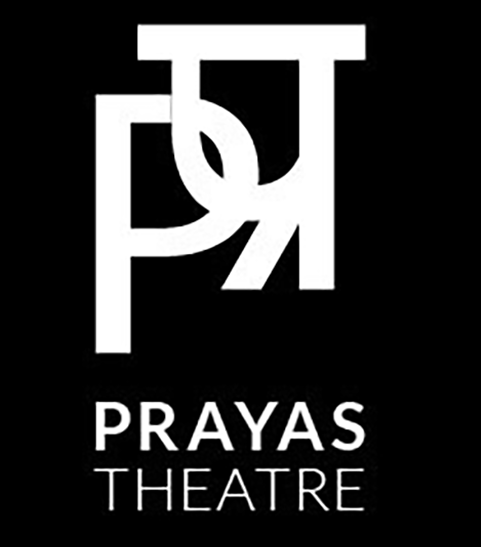Prayas was always more than a theatre group.
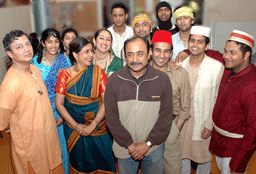
It started that way and the players who joined have wanted it to remain so. Those who found their way to it had individual ideas. Somewhat scattered, disjointed, but wanting to tell our story, that of the migrant Indian in New Zealand. It was more than community theatre, we wanted to tell stories in a way that would reflect the wider theatre rules and traditions. We worked bloody hard on our stories, our ideas – always conscious of the need to be presenting entertainment people would pay to see, would appreciate.
It was more than just presenting our own archetypes. We went to places that made us uncomfortable. To be understood, we tried to explore ourselves. We unwrapped the migrant angst.

The feeling of belonging or not (Swabhoomi, Khoj).
The shocking story about Indian women who take up mourning and wailing for the dead as a profession to feed their living (Rudali).
Anarchy through poetry (Tasher Desh).
History (Dara) and Folk theatre (Charandas Chor). Laughter (Love N Stuff) and tears (A Fine Balance).
Sometimes we did it all in one show (First World Problems).
We could chart our progress from the desperate selling of tickets to friends and family, so we were at least covering costs, to hanging out the “Sold Out’ board. This progress was made, not with rehearsals in places with sophisticated doors and windows but rather in windswept, cold, church halls. Places we did not have to pay much for. The warmth was not from heaters, but from the enthusiasm of the souls who believed in the idea of Prayas.
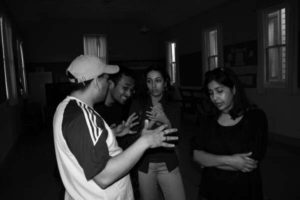 Many of those who came to Prayas had theatre or media skills that found a place on stage. It was more than dressing up a player in a colourful saree. Make-up, costume, and dance choreography, for example, were something we paid a lot of attention to, along with lighting and sound. We had some music aficionados within the tribe that led to post show reactions, as “The show was great, but the music was outstanding!” It was all part of the package. We found ourselves with a growing army of friends and supporters; people who did not always want to be on the stage, but were more than willing to be behind it, or out at the door, ushering in renewed energy and hope. We found funders who wanted to invest in a culture.
Many of those who came to Prayas had theatre or media skills that found a place on stage. It was more than dressing up a player in a colourful saree. Make-up, costume, and dance choreography, for example, were something we paid a lot of attention to, along with lighting and sound. We had some music aficionados within the tribe that led to post show reactions, as “The show was great, but the music was outstanding!” It was all part of the package. We found ourselves with a growing army of friends and supporters; people who did not always want to be on the stage, but were more than willing to be behind it, or out at the door, ushering in renewed energy and hope. We found funders who wanted to invest in a culture.
Sometimes, they found us.
All these years on, we recognise the various turning points. Our first production 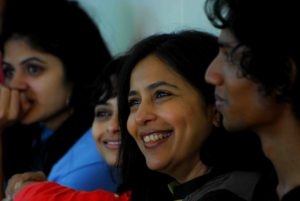
Charandas Chor – The Honest Thief, began with a bang and was as honest in its efforts as the thief of the show who stood by his principles. Rumours were abuzz – here was a theatre company that promised to bring great Indian works to New Zealand. The tickets sold through networking, community support; we called everyone in our phone books. There were many empty seats, but the applause was fulfilling and heart-warming in the middle of a winter performance. The wider community heard about us through the media, and there was a hunger to see what it was all about.
Emboldened by the response, Prayas dared to present the modern story of conflicting relationships in a sophisticated city setting. When first performed in India, The Terrace by Madhu Rye created cultural shock waves. The lack of response here left Prayas reeling with shock too. The story about an illicit affair, highly charged emotions and tensions between people wasn’t ‘Indian’ enough for Auckland and it bombed.
It was time for introspection. The team had many conversations to see what would be the next direction. We concluded there was a disconnect between what we thought would work and what our audience wanted to see. Charandas Chor ran well as an inaugural piece but to sustain interest of local audiences, we needed to tell a story that was relatable.
So we told our own story. The migrant story.
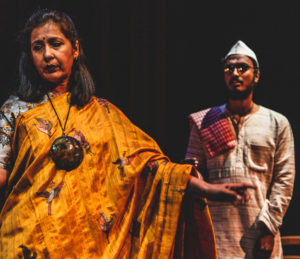
Our funding went into exploring the migrant journey over many emotionally charged workshops. The effect was cathartic for most and out of this rich collection of anecdotes was born ‘Khoj – The Search’. It was loosely based on a story from the work of Rohinton Mistry’s ‘Tales from Firozsha Baug’. The play owed much to community input.
“Khoj boldly challenges both the migrant community as well as local New Zealanders regarding preconceived ideas about people and cultures.” The story of a young migrant man, who is torn between his home and his new country, was told with the help of a toilet metaphor. To Squat or Sit was the question, and out of this delicate toilet humour, thinly veiling the deeper ‘where do I truly belong’ conundrum, we found the right balance of an audience from here and there.
The shows ran to full capacity with people queuing for tickets outside the TAPAC venue. The news spread like a raging forest fire. And just like that, by word of mouth, Prayas regained its place in New Zealand theatre.
We are a group that has built up a wider goodwill in the public mind. Our audiences recognise us now; our funders believe in us; they know we are capable of tremendous art. It’s both an honour to have that trust – and a welcome burden.
We have been recognised and celebrated. Even then, sometimes when we sit down for a debrief after a ‘houseful’ show, we reflect upon the times when we were a small group in a cold, windswept church hall.
Sudeepta.

Sudeepta Vyas
